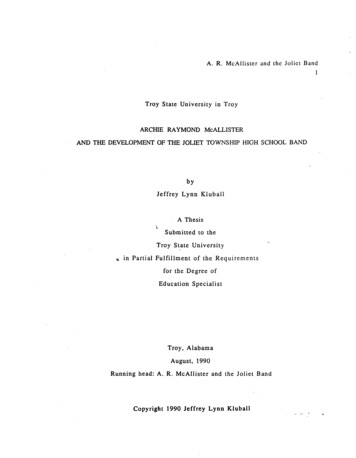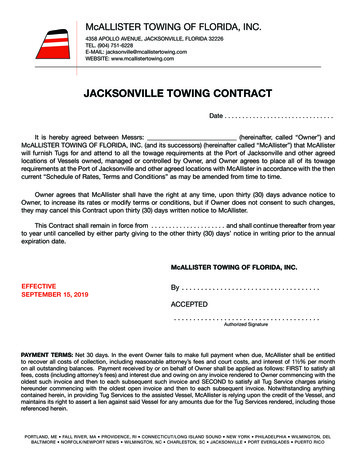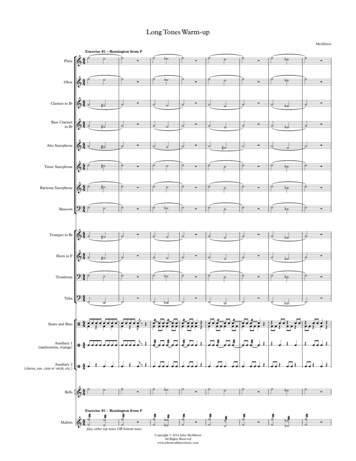
Transcription
A. R. McAllister and the Joliet BandTroy State University in TroyARClllE RAYMOND McALLISTERAND THE DEVELOPMENT OF THE JOLIET TOWNSHIP HIGH SCHOOL BANDbyJeffrey Lynn KluballA ThesisSubmitted to theTroy State University"" in Partial Fulfillment of the Req uirementsfor the Degree ofEducation SpecialistTroy, AlabamaAugust, 1990Running head: A. R. McAllister and the Joliet BandCopyright 1990 Jeffrey Lynn Kluball
A. R. McAllister and the 101 iet Band2AcknowledgementsI wish to thank Dr. David Eisler and the Troy State University MusicDepartment for their support and guidance in this study.Dr. ForrestMcAllister provided much insight and was most helpful throughout theproject.Recognition must also be given to all the Joliet Band Alumni whoprovided information by completing questionnaires, giving phone interviews,and sharing their band experiences in letters.I wish to express my gratitudeto Carol Kluball for her encouragement, support and understanding withoutwhich this study could not have been completed.
A. R. McAllister and the Joliet Band3IntroductionArchie Raymond McAllister was a music education phenomenon.Raisedon a small family farm without formal music instruction, McAllister developedthe Joliet Township High School Band from its inception into a nationallyacclaimed champion high school band.McAllister's stringent high musicaland disciplinary standards positively influenced thousands of his formerstudents and peers alike.His impact also facilitated and promoted thedevelopment of band programs and professional band leadership associationsthroughout the nation.The Joliet Township High School Band, first taught in a woodworkingshop with nail kegs for chairs, became the epitome of band organization anddiscipline under McAllister's instruction. The Joliet Band earned numerousstate and national titles.The group traveled extensively and impressedaudiences from New York to California.Many instrumental organizations,including the United States military bands, tried to emulate the Jolietinstrumental program.To date there is not any known completed study of Archie RaymondMcAllister and the Joliet Township High School Band. This may be due to thediverse variety of sources not before known to the public.However, such astudy is a logical and worthwhile activity to document the qualities whichmade Mr. McAllister an outstanding pioneer in music education.Much of the material contained here was obtained from Mr. McAllister'spersonal letter file and band scrapbooks recently donated to the music
A. R. McAllister and the Joliet Band4archives of the Troy State University Music Department by Dr. ForrestMcAllister, Archie McAllister's son. These historical documents providedmuch of the basis upon which to build and conduct this study.
A. R. McAllister and the Joliet Band5MethodologyIn July of 1988, this historical survey began with the study of ArchieRaymond McAllister's personal letters, documents and scrapbooks containingmemorabilia of the Joliet Township High School Band. These materials weredonated to the National Band Association (N. B. A.) Hall of Fame ofDistinguished Band Conductors archives housed at Troy State University, Troy.,Alabama, by Archie McAllister's son, Dr. Forrest McAllister.This information was researched and organized chronologicallytobuilda framework upon which to construct a historical project. Letters were mailedto members of the N. B. A. who might have known A. R. McAllister to solicitany pertinent information.Very little information was received that washelpful.The Joliet Herald News in Joliet, Illinois, was contacted for assistance insoliciting information from its readers who might have been band alumni.OnSeptember 9, 1988, an article was mailed to the paper concerning the researchproject to solicit information from its readers. The article entitled McAllisterband students- Where are you: researcher was edited and published in theShowcase entertainment section of the newspaper on September 25, 1988. Theresponse to the article was tremendous!Questionnaires were sent to each responding alumnus.returned completed.band experiences.Of these, 26 wereMany contained letters and photographs relevant to pastNames and addresses of other alumni who might beinterested in contributing in the study were also given. Several subjects
A. R. McAllister and the Joliet Band6called and gave taped phone interviews. The information collected from theabove was merged with the data from the University archives to further thestudy.Archie McAllister's son, Dr. Forrest McAllister, was most helpful incontributing needed information to the study.A rough draft was sent toDr. McAllister for proofing to identify any misinterpretation of information.Many corrections were made.incorrect data.In some circumstances the original source gaveDr. McAllister was very pleased with the progress of the studyand most helpful and anxious to see it completed. Dr. McAllister also gave mehis sister's name, Mrs. Henning Hanson, and her phone number.She alsocontributed information.Dr. McAllister has also been helpful in numerous phone interviews. Heprovided information to facilitate completion of this historical survey of hisfather's life and the Joliet Band where other sources were insufficient.Personal contact with family members and former Joliet band memberswas found to be the most rewarding personally.This historical survey was conducted to assist instrumental musiceducators by instilling in them the need for McAllister's high musical anddisciplinary standards.
A. R. McAllister and the Jol iet Band7ChildhoodArchie Raymond McAllister was born July 28. 1883 in humblesurroundings on the family farm in Jackson Township eight miles [romElwood. Illinois. Archie. born to a "Scotch Dad and a Yankee Mother" (Smith.1930). was the eldest of four children. The McAllister family did not oftentravel by horseback or by walking to EI wood or nearby J 01 iet due to timelimitations caused by farming responsibilites.From his early childhood Archie became very fond of music.He wasvery inquisitive as to how musical instruments produced their sounds.Hewould spend much of his time creating or copying musical instruments withwhich to play and experiment.When farm responsibilities would release himfrom his assigned chores. Archie would utilize this time by "making corn-stalkfiddles and playing on elder flutes" (Smith, 1930.p. 7).Learning to play the cornet was one of young McAllister's personalambitions. At the age of 12, he asked his father for a cornet (IT Band, 1962).The McAllister farm's financial situation did not allow him the outrightpurchase of a cornet. Instead. a piglet was given to Archie by his father.Archie. then only fourteen. raised the piglet on a bottle to enter it in theupcoming Will County Fair.McAllister won first prize and used his winningsand money from selling the pig to purchase a cornet from 1. W. Pepper. Thus,his musical career began.Tragedy struck the McAllister household when Archie was but sixteen.His father's death forced him into the providing role for his family.Even with
A. R. McAllister and the Joliet Bandgthis added responsibility he was able to play his cornet in the Elwood SilverCornet Band (Bauer, 1960, p. 36). Successfully auditioning for this groupdemonstrated McAllister's mastery of the cornet in only two years!McAllister was not certain as to what type of career to pursue.His firsttrue love was music, but with the encouragement of his family, he decided todo something more practical. He pursued many different types of professionsbefore selecting music as a career. At the age of eighteen, McAllister left thefarm and decided to become a personal secretary to an interurban electricalcompany.Many of the organizational skills learned on the farm were put intouse and were further developed at this company. Little did McAllister knowthat these skills would be put to use in one of the most comprehensiveinstrumental music programs in the future.Many of the McAllister's neighbors predicted, "That McAllister boy[Archie] will come to some bad end" (Smith, 1930, p. 7). These predictions wereall proven to be false by McAllister's many successes in his musical career.One such success took place simultaneously to leaving the farm.McAllisterorganized and led the Ladies Silver Cornet Township Band which proved to beone of his most rewarding experiences (Zusag, 1956, p. 26). McAllister assessedeach member .25 for expenses and the following year the near symphonicsized band won first prize in a contest. The band won a music storage rackeven though they were the only band in the competition.At another contestthe group won 5.00 against considerable competition (Smith, 1930, p. 7).While commuting to work in the interurban area, McAllister met a
A. R. McAllister and the Joliet Band9young lady by the name of Clara Worst of Plainfield, Illinois.They becamevery close friends and were married on September 5, 1906 at the MethodistChurch in Plainfield, Illinois (F. McAllister, personal communication,February 23, 1990).During this period of McAllister's life he attended businessclasses and later became an auditor for a street car company.Becoming disenchanted with his work behind a desk, he quit his job andeven sold his cornet.Several business men in Joliet invested in the businessventure to develop a fruit ranch in the Bitter Root Valley area in Montana.The dream of working outside, using his hands as he did as a child, attractedMcAllister so much that he moved to Montana and resided there a couple ofyears.While on the ranch, McAllister pursued his hobby of woodworking.Hebuilt furniture and many other decorative and practical appliances for thehome.The fruit ranch proved to be unsuccessful and A. R. moved back to theJoliet area.He studied manual training with Clara's uncle, Edward Worst,Superintendent of Industrial Arts, Chicago, to become a shop teacher(F. McAllister, personal communication, August 3, 1990).Upon returning from Montana, McAllister became a member of theJoliet SteelworJcers Industrial Band. He studied manual trades and music toincrease his meager knowledge."Mr. McAllister himself spent much time inthe study of music and keeping abreast with the times, but he can truly becalled a self made man" (An intimate chat about A. R. McAllister, 1930).McAllister studied under some of the nation's most famous music educators."A. R. McAllister studied directing at the A. F. Weldon School, Chicago [since
A. R. McAllister and the Joliet Band10Mr. Weldon's death known as the VanderCook College of Music j, for six yearsfollowed by two years at the Conn National School, Chicago, under the lateFrederick Ennis" (Will Joliet Win, May 1928).Upon completing his manual training and graduating from LewisInstitute, McAllister taught in the Jewish Training Schools of Chicago for twoyears (Bauer, 1960, p. 36). He also performed in the Municipal Band and theDixieland Band. His oldest son, Leslie, was born at this time. After teachingmanual training two years at the Jewish Training Schools, McAllister wasoffered the same type of teaching position at Joliet Township High School."In 1912, when McAllister was in his early twenties, there appeared inJoliet an all girl brass band.'Mac,' in his spare time, had organized the groupat the Trinity Methodist Episcopal Church" (Thompson, p. 1). While McAllisterwas teaching manual training at Joliet High School in 1913, J. M. Thompson,the music supervisor, carefully planned and organized the grammar schoolband. The school board voted an appropriation to purchase 25 horns for thegrammar school. This created an interest in bands in the Joliet Schools(Thompson, p. l). The grammar school band was supported by the City Board(F. McAllister, personal communication, August 3, 1990).While McAllister was teaching at Joliet the Superintendent of Schools,E. B. Brown, attended a football game in Rockford, Illinois. SuperintendentBrown was very impressed with the Rockford Band because they performed inthe grandstands during halftime.Superintendent Brown decided he wanted aband at Joliet Township High School. The band for the high school would be
A. R. McAllister and lhc Jolicl Band1)supported by the Township Board (F. McAllister, personal communication,August 3, 1990). This was the inception of what would become one of thenation's greatest musical organizations, the Joliet Township High School Band.Once in teaching, McAllister led a quiet personal life.He enjoyedgolfing, fishing and his family. As devoted family parents, Archie and Clarawere blessed with five children: Leslie, Lois, Forrest, Archie, and Billy, whopassed away in infancy.All the children were reared with a firm loving hand."He [A. R. McAllister] did not show it too much but he was a very religiousman. . He lived the various teachings of the scriptures; very kind, veryconsiderate, [and] very firm" (F. 'McAllister, personal communication,November 17, 1988). High moral values and ethical conduct were twoattributes possessed by McAllister. The children were reared in the same strictdiscipline that the Joliet Band became known for (Bauer, 1956, p. 36)."McAllister ran a tight ship" (W. D. Revelli, personal communication, June 25,1988) in both personal and professional life. Lois H. McAllister Hanson, Mac'sdaughter, spoke of her father as being" . straight forward, strict andcompassionate. He had the same discipline with his children at home as he didwith the Joliet Band" (personal communication, January 19, 1990).The Inception Of The Joliet Township High School BandThe birth of the Joliet Township High School Band is very similar to thebeginnings of many other bands. "The scene was the office of the High SchoolSuperintendent, or rather the outer room of the office; the time was Nov. 11, .
A. R. McAllister and the Joliet Band12and around the table sat 1. Stanly Brown. H. A. Stillman. Harry Leach. John H.Garnsey, Dr. F. W. Werner and Herbert W. Spencer" (The Spectator. June 17,1927). Several questions were brought up as to the justification of having ahigh school band and how much of a tax burden a band would be.After muchdiscussion. "Stillman moved the band matter be referred to the supplycommittee with power to act. It was a great step. a great plunge into whatseemed an extravagant expenditure of public funds. but the board stood by itsdecisions. and the committee reported on Dec.ll that it had given an order for15 second hand instruments" (High School Band Given Praise by Citizens,1927). The instruments arrived in approximately four weeks.The expenditurefor the instruments was justified by the board on the premise the band wouldbe of assistance to athletics. The total funds spent was less than three hundreddollars.Upon receiving the instruments. the process to select a band leaderbegan. In looking through the'resumes of the staff at Joliet High School. theadministration noticed the woodworking teacher in the manual training shophad experience playing the cornet. The manual training instructor. ArchieRaymond McAllister. was offered the band position in addition to leachingmanual training and he accepted the position as the original Joliet TownshipHigh School Band leader (F. McAllister. personal communication. August 3.1990)."For several years he conducted the band in conjunction with manualtraining work. using his own lunch period for practice time. and receiving no
A. R. McAllister and the Joliet Band13compensation for the work. Later, the school board, at thein istanceof twomembers, Dr. F. W. Werner and H. A. Stillman, appointed Mr. McAllister fulltime band director" (A. R. McAllister, 1944).The young Joliet Township High School Band's rehearsal facility waslacking both acoustically and equipment-wise.Band was taught in the manualtraining room in the presence of power tools and equipment.and stands were nonexistent.Music chairsMcAllister persevered, and made the necessarychairs from old nail kegs that were assembled in the shop classes by nailingboards on the kegs for back supports (F. McAllister, personal communication,November 17, 1988).The original band began rehearsal in March, 1913 (F. McAllister,personal communication, August 3, 1990). At first, the rehearsals "started withindividual instruction, then sectional, then band" (1927 National ChampionHigh School Bands, 1937). McAllister was excited about the creation of a newband program. Since it began so humbly, each day was an improvement.What seemed an impossible obstacle to many was just another challengetobemastered by band leader McAllister.McAllister had no published beginning band method book to use. Theyoung band director accepted this challenge by studying and transposing thebeginning cornet method from his youth.He taught using " . a transpositionfrom an elementary cornet book for material to work with"(Zusag, 1956).Shortly thereafter, McAllister met with H. A. VanderCook of Chicago and wi thVanderCook's assistance, a published beginning band method was selected
A. R. McAllister and the Joliet Band14(F. McAllister, personal communication, November 17, 1988).From the very beginning, McAllister expected and recci ved total effortand respect from each of his band students. "He was a General Palton of themusic world" (Willard Kraker, Joliet Bandsman 1931-1934, personalcommunication, November 22, 1988) and " . a stern task-master" (EvanGrandberg, Bandsman 1931-1934, personal communication, December 19, 1988)."His bearing made you feel proud that he was your band director" (VirgilLong, Joliet clarinetist, personal communication, January 6, 1989).In his first rehearsal, he originated and established his famous "Results,no alibis." (Bauer, 1960, p. 36) slogan. This slogan established a pride amongMcAllister's students to work very hard and to persevere under strictdiscipline. Such discipline in and an attitude toward rehearsal facilitated theband's maturity.Before the beginning of a rehearsal, the band would bewarming up, but when McAllister opened his office door to come out for thebeginning of rehearsal, total silence reigned in the bandroom.He was sincerewith his students and their needs and took a personal interest in each one.Once before a tour "there was one boy even poorer than the rest of us [theband]. He had no clothes to go [on tour]. So Mac got him [the student] a suit, [a]couple shirts and a tie so he could go. That made us all feel good" (RobenMcGuire, Joliet bassist 1934-1938, personal communication, November 17,1988). If any student was sick McAllister would call to see if the child was allright. Mutual trust and accountability were created between teacher and.student. "Students would rather take a beating than tell Mr. McAllister they
A. R. McAllistcr and the Jol iet Band15could not attend a rehearsal because [of any reason] . " (F. McAllistcr,personal communication, November 17, 1988).Quality leadership best describes McAllister according to Don Doubleday,1934-1938 Joliet Trombonist:There are certain characteristics, attitudes and methods common toexceptional leadership regardless of the scope of the task at hand.The effort of quality leadership is the development of respect.Respect for the group, respect for the individuals of the group, andrespect for one's self in the functioning of the group. This respectis not solely from the bottom up but also from the top down as wellas horizontally. This ability, or gift, was Mac. He was anexceptional leader, and with exceptional leaders respect mergeswith love (personal communication, December 19, 1988).McAllister was known for being very consistent and fair in hisdiscipline and evaluations of his students. As a disciplinarian McAllister had away to give criticism with a caring smile that took the edge off but you knewhe meant it (Robert McGuire, bassist 1934-1938, personal communication,November 17, 1988). Favoritism was not mentioned in any of the studentssurveyed. "His (Archie's) own children participated in the band as they grewolder, but no favoritism was ever allowed. His sons, Leslie, Forrest, and Archie,Jr. received the same strict discipline as all of his band boys" (Zusag, 1956,p. 16). If a student talked in rehearsal, Mr. McAllister would look at the studentand then the door; and the student would then remove himself from the room
A. R. McAllister and the Joliet Band16without any other words being spoken (F. McAllister, personalcommunication, November 17, 1988). When McAllister removed a student fromthe rehearsal, the student knew he had broken the rules."We learned fromMac, [that] discipline is as important as the ability to play your instrument ormaybe more so" (Ross Engimann, saxophonist 1934-1938, personalcommunication, February 1, 1988).McAllister used chair placement tryouts the first week of each semesterto determine seating and band placement.All students including seniorsauditioned alone for McAllister. Everyone tried to better his position in thesection (Raymond Fahr, alto clarinetist 1937-1941, personal communication,October 11, 1988). McAllister "showed no favoritism and constantly kept hishigh school musicians on their toes. He babied no one" (Louis J. Fifer,,.Trombonist 1937-1941, personal communication, February 20, 1989). Eachstudent was given a score and then ranked appropriately.The most proficientmusicians were placed in the top band until full instrumentation wasachieved. After full instrumentation was met, students were placed in theR. O. T. C. (second) Band.According to the Northside Citizen (September 11, 1925), the band hadonly five weeks rehearsal before its first performance for a student assembly(Crack Band, 1925). The Joliet Herald News wrote of the quality of the premiereperformance, "To say they made a good impression would be putting it mild.just a few months a band is made. An encore was required" (Joliet HeraldNews). After describing the rehearsal room and his method of rehearsal,In
A. R. McAllister and the Joliet Band17McAllister stated the following of the students entering the band program, inaddition to the original 12, "We added two drums and two more volunteers whofurnished their own instruments.Now we number sixteen.Our firstappearance was a school assembly. Then in April we played a baseball game"(1927 National Champion High School Bands, 1927).A picture of the original Joliet Township Band of 1914 is found in theSpectator (June 17, 1924) listing the following original members "ForrestMerrill, Ahlvia Tehle, Joseph Wallace, Reginald Wagner, George Lagen,Howard Schluntz, Everett Meader, Franklin Bush, Merrill Zinzer, Clark Feeney,Hobart Schulenberg, Elmer Brockway, Carl Calmer, Dave Hirsh, Hollis Miles,Herbert Folkers, Herbert Hinricks, and Raymond Pretz." McAllister was aperfectionist even in staging the band's pictures. Each picture personifiesdiscipline due to meticulous attention given to detail. All the band memberstook pride in this director trait. Each annual" . picture shows the strengththat he [McAllister] had given to all who have known him" (Frank Muhich,clarinetist 1934-1938, personal communication, November 1988).McAllister's bands through history had a very rigorous rehearsalschedule. Each band rehearsed daily during the regular school day, butduring contest season rehearsal occurred two or three times daily whichmeant before and/or after school. Each student received individual privatelessons weekly from McAllister himself and each student was expectedwell prepared and was expected to show much improvement.was emphasized in these private lessons:tobeMore than music
A. R. McAllister and the Joliet Band18He [McAllister] had a talk with me about self confidence. He tried toinstill that in me and I can honestly say that he succeeded.Afterthat I remembered the lesson and feel that much of what I did inlater life, where self-confidence was needed, was largely due tothat lesson.One [of] the other lessons that most everyone who was in theband got from Mr. McAllister was self-discipline. His strictness andattention to detail have helped former band members whether theyrealize [sic] it or not. A lot of A. R. McAllister rubbed off on peoplebut they were not aware of it. Few can say he [McAllister] had noimpact on their lives (Bernard H. Baher, clarinetist 1934-1938,personal communication, March 10, 1989).McAllister encouraged each of his students to take private lessonsoutside of school with one of the many competent music teachers in the area.In the band's early days about 50 percent of the students studied privately; but.as the competition grew for chair and band placement, in the future nearly100 percent studied privately (F. McAllister, personal communication,November 17,1988). An example of one of his private instructors is Jesse Fieldsof The Joliet Music College, who taught approximately eighty-fiye brassstudents each weekCW. Revelli, personal communication, July, 1988). Eachsection in the band had separate sectional rehearsals under Mr. McAllister orone of his well-trained section leaders briefed by the director each week.During the summer months there was a weekly two hour rehearsal that all
A. R. McAllister and the Joliet Band19attended.The band continued to grow and prospered under McAllister'sleadership. Music was perfected by "his ability to blend sections together tomake a band sound like a great organ. He directed similar to Sousa, no greatflourish, just easy to follow" (Virgil Long, clarinetist, personalcommunication, January 6, 1989). In rehearsal:He demanded best effort from all the band members, and got it. Ineach section, members were seated according to ability, so memberswere motivated to work toward first chair. He [McAllister] was adedicated perfectionist but with an understanding of students.Hetried to select music that the members enjoyed playing, and/orexplained the source or story of the selection. He expected anexcellent performance and motivated the members to accomplish it(David Malby, clarinetist 1934-1938, personal communication,November 25, 1988).McAllister never approached a rehearsal or performance ill prepared."Hisstudious study of a musical score showed in a performance" (Russell Smith,oboist 1929-1932, personal communication, October 11, 1988).The Joliet band leader personified patriotism and civic responsibility.He expected each of his members to do likewise. A 1923-1927 Joliet trombonistsaid McAllister was "an inspiration to anyone who played under him" (AndrewBarber, personal communication, November 15, 1988). "McAllister's influencewas felt and contributed to all who studied under him" (Gordon A. Osmus, Sr.,
A. R. McAllister and the Joliet Band20Bassist 1934-1938. personal communication. January 21. 1989). . His life wasdevoted to that school. His one ambition was to see Joliet Township High Schoolon top not only in music but in every field of endeavor.He was on hand forevery basketball game, and his band played for every athletic event held bythe high school" (Zusag, 1956, p. 26)."By 1917, the Joliet Township High School Band had a nationalreputation. They were asked to play for conventions. fairs. and militarycamps" (Bauer. 1960. p. 36). From 1917 through 1918. the small Joliet TownshipHigh School Band distinguished itself when it played for every militaryassignment of men who left for combat duty and for every train load ofsoldiers stopping in Joliet enroute to camp or the front lines of World War I(National Contest Program. March 1928. p. 11).In January of 1918. the Joliet Township High School Band receivednational recognition for its quality and service. It was selected as the officialband of Camp Pershing. Louisville, Kentucky. At the call of war, seventeen ofthe nineteen living original band members entered the service.During thesummer of 1918, the Joliet Band spent two weeks of the summer at Steever.Lake Geneva. Wisconsin. for a music camp and received "The Best BandAppearing in Summer" award ("Crack band". 1925).On most of the band's trips McAllister scheduled concerts to beperformed enroute. Some performances were stand-up concerts or paradesthrough the business districts to the municipal buildings for concerts on theirsteps. Some were only at the train stations during stops.
A. R. McAllister and the Joliet Band21Performing for service and civic organizations was very important toMr. McAllister and the Ioliet Band. These performances included playing for awide variety of volunteers such as all Red Cross activities, Boy Scout dri Yes,Association of Commerce activities and every Liberty Loan issue.Community events, such as Memorial Day Parades, al ways includedthe band. His band gave the school and community a name in themusic world which will follow it down through the years, but whenthey went on concert tours it was introduced as the Joliet TownshipHigh School Band rather than his band. It was he [Archie McAllister]who brought Ioliet the name, 'City of Champions' " (Zusag, 1956, p. 26).The performers took great pride in their musical performances.Ioliet Rotary Club included the band whenever possible in its activities.TheIn1920, the band escorted the Ioliet Rotary Club members to the InternationalConvention in Atlantic City, New Jersey. For the band's performances at theconvention the band was awarded the Boy Band Banner.While in AtlanticCity, the band performed a week's· engagement on the board walk wi thperformances at Gettysburg, Washington, D. C. and Niagara Falls. The bandalso received "The Cup of Philadelphia" for its performance there (Crack band,1925).The Citizen Military Training Corps at Camp Roosevelt were entertainedby the Ioliet Band in 1921-1922 in Rolling Prairie, Indiana. "In 1921, it [theJoliet Band] was made [the] official band of CMTC (Citizens Military TrainingCorps) and began to get recognition from the U. S. government" (JT Band,
A. R. McAllister and the Joliet Band221962). During the 1923 triptoCamp Roosevelt. the band performed at La Pone,
A. R. McAllister and the 101 iet Band 2 Acknowledgements I wish to thank Dr. David Eisler and the Troy State University Music Department for their support and guidance in this study. Dr. Forrest McAllister provided much insight and was most helpful throughout the project. Recognition must also be given to all the Joliet Band Alumni who










